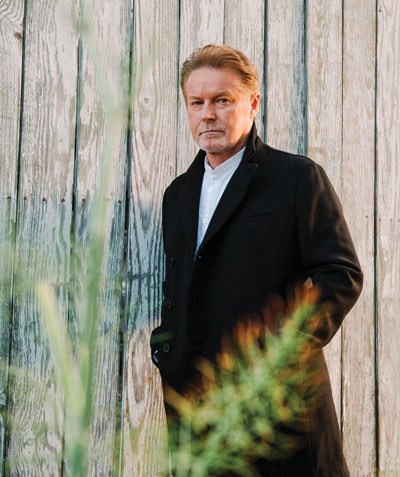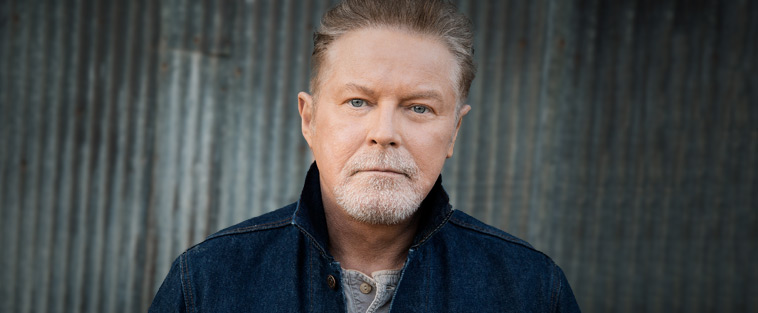By Donald Liebenson
“I like where I am now,” Don Henley sings on Cass County, his fifth solo album, and first in 15 years, released last September to rapturous reviews and chart-topping sales. Where he is now is on a tour of Europe and North America that brings him to Ravinia on August 14 and 15. “I wouldn’t exactly call this a ‘greatest hits’ tour,” he offers in an e-mail exchange with Ravinia magazine. “We do perform several ‘hits,’ both from the Eagles catalog and from my solo albums, including Cass County. But we also do some deep album tracks, a few numbers that we haven’t done in a very long time. It’s a good mixture of the familiar and the unexpected. We recently completed the European segment of the tour, and the fans, as well as the media, were very pleased with the show. So, I hope people here at home have a similar reaction. I have an amazing band, including a horn section, and it’s great working with so much talent.”
 Compiling a setlist spanning a decades-long career of era-defining music—and his fans’ most cherished songs that get the best of their love—along with new material that represents where Henley is now, is a delicate balancing act. Call it the “Garden Party” dilemma. Rick Nelson’s top-10 hit, released in 1972 (coincidentally the same year of The Eagles’ first hit, “Take It Easy”), chronicled an ill-fated Madison Square Garden concert appearance in which his attempts to perform new material were greeted, so the song goes, with hostility by the audience. The moral: “You can’t please everyone, so you’ve got to please yourself.”
Compiling a setlist spanning a decades-long career of era-defining music—and his fans’ most cherished songs that get the best of their love—along with new material that represents where Henley is now, is a delicate balancing act. Call it the “Garden Party” dilemma. Rick Nelson’s top-10 hit, released in 1972 (coincidentally the same year of The Eagles’ first hit, “Take It Easy”), chronicled an ill-fated Madison Square Garden concert appearance in which his attempts to perform new material were greeted, so the song goes, with hostility by the audience. The moral: “You can’t please everyone, so you’ve got to please yourself.”
Henley offers his own take within “No, Thank You,” one of the Cass County songs: “Though nostalgia is fine, I respectfully decline to spend my future living in the past.”
“I understand that people want to hear the songs that are familiar to them,” he explains, “songs that are attached to certain memories, to certain times, places, and events, and I am happy to play those songs. But I’m not content to do only that. Even at my age [68], I need to experience growth and change. The great Chilean poet-diplomat Pablo Neruda [is attributed to have] said:
You start dying slowly if you do not travel, if you do not read, if you do not listen to the sounds of life. … You start dying slowly if you become a slave to your habits, walking every day on the same paths. … You start dying slowly if you avoid feeling passion or the turbulent emotions; those which make your eyes glisten and your heart beat fast. You start dying slowly … if you do not allow yourself, at least once in your life, to run away from sensible advice.
“That’s the way I feel about putting together the setlist,” he continues. “Some of my favorite songs that I’ve written or co-written were not ‘hits.’ So I try to strike a balance between hits and lesser-known album cuts. But, in the end, it’s one of those ‘damned if you do and damned if you don’t’ situations. I’ve been slammed for doing too many oldies in my show, and I’ve been slammed for taking more risks and playing more obscure songs. No matter what I do, somebody’s not going to be satisfied, so I just go with what instinctively feels right on any given day, and one show may be different from the next. Trying to please everybody all the time will backfire, sooner or later. At this stage in my life and career, I’m not into calculation and second-guessing. I want to enjoy my work for the remaining time that I have—and that’s what I’m doing.”
But Henley does take special care when it comes to the Eagles canon. Henley has referred to The Eagles, whose last studio album, the Grammy-winning Long Road Out of Eden, was released in 2007, as “the mothership” that afforded him the opportunity to go on solo flights to perform his own music. With the tragic death in January of bandmate Glenn Frey, with whom Henley cowrote some of the band’s most enduring songs, including “Desperado,” “Lyin’ Eyes,” and “Tequila Sunrise,” Henley does not foresee the surviving members of the band continuing to perform as The Eagles. Accompanied by Jackson Browne, they played at the Grammy Awards in March in tribute to Frey, and it was most likely the band’s final performance. When asked if he could imagine a reunion to mark the band’s 50th anniversary, à la the Grateful Dead, Henley responded with an unequivocal “no.”
Henley is also clear on what he sees as his responsibility as “the curator of these songs” (or at least the ones that he and Frey cowrote). “Glenn and I, along with our manager, Irving Azoff, always took great care to make sure that our songs were not misused or misappropriated, which is a constant battle in this age of the Internet,” he states. “We never allowed the songs to be used in advertisements or commercials. We rarely licensed any of our catalog for use in films or television programs. I intend to carry on that tradition. It matters to me that people’s associations with these songs—their memories, their emotions—are kept pure. When I perform Eagles classics now, my band and I will keep the musical arrangements faithful to the original versions, because that’s the way the fans want to hear them. I might take liberties with some of my solo material, but not with the Eagles songs.”

Cass County is a celebration of Henley’s musical roots and is in stark contrast to the disposable “bro country” that dominates country radio playlists. The collection features collaborations with guest artists Miranda Lambert, Mick Jagger, Merle Haggard, Trisha Yearwood, Lucinda Williams, Alison Krauss, and Dolly Parton, who is making her own long-awaited return to Ravinia August 7, and whom Henley admiringly calls “a steadfast friend and musical partner.” It’s also a reflection of the diverse musical styles the young Henley heard on his radio growing up. “The most impactful station during my boyhood was a station in Shreveport, Louisiana, KWKH,” he recalls. “It featured a program called The Louisiana Hayride, which was first a radio show and then became a television show broadcast from the Municipal Auditorium in Shreveport. The show’s heyday was from 1948 to 1960. It’s where Elvis made his first radio broadcast performance in 1954 and his first televised performance in 1955. The list of performers on the Hayride series included Hank Williams, Kitty Wells, Bob Wills & the Texas Playboys, Patsy Cline, George Jones, Johnny Cash, Tex Ritter, Jim Reeves, and many others who went on to become big stars. A few years later, in my early teens, I listened to WNOE, a 50-thousand-watt station that was located in New Orleans, about 330 miles from my little hometown. Some of the music I heard on that station was indigenous to New Orleans and rarely got played anywhere else.
“Sometimes, when conditions were just right, I could also pick up KOMA, broadcasting from Oklahoma City and, occasionally, WLAC in Nashville, which featured the famous DJ “John R.,” who from the late 1940s to the early ’70s had a nightly program on which he played R&B records that nobody else was playing. In my mid-to-late teens, I listened to KEEL in Shreveport and KLIF in Dallas. They played pop, rock, soul, and even some country music. There was a lot of variety.”
It’s an era of radio Henley feels lucky to have grown up in. “I don’t want to get on a ‘things used to be so much better, sonny boy’ soapbox,” he jokes, “but, yes, we were lucky to grow up in an era that was less homogeneous, a time before everything was formatted and put into neat little boxes; a time when you didn’t have to do a lot of channel-surfing to be exposed to a wide variety of musical genres and styles. You might not have liked everything you heard, but you were able to discover things you didn’t know you liked because it all got played on the same station. It’s not healthy for art or culture to be monotonous. Whether it be art, politics, or religion, if we see and hear nothing but a narrow spectrum of messages, ideologies, philosophies, styles; if we get trapped in a ‘one-flavor-only’ universe, our minds and our lives are diminished. Today, everything comes neatly presifted and prepackaged for you.”

Mostly recorded in Nashville, Cass County debuted at number one on Billboard’s Top Country Albums chart, and it was the top selling album that week. But Henley modestly downplays the achievement. “It was a nice thing, but it’s really not that hard anymore for an established artist to open at number one in the charts in the first week of a release,” he says. “The hard part, these days, is staying there, or even staying in the top 20 for any significant length of time. Records come and go very quickly now. … I feel bad for young artists who are trying to make it in the music business now. It was never easy, but it has become so much more difficult in the digital age; hard to get discovered and harder to make a living.”
In “Where I Am Now,” Henley sings, “I’m making one last victory lap and then I’ll take a bow.” It’s been 44 years since he was in his ’67 Chevy in Los Angeles near the intersection of LaBrea Avenue and Santa Monica Boulevard when he first heard “Take It Easy” played on the radio. But Henley, who has eight Grammys—six with The Eagles and two for his solo work—is still in this for the long run.
Henley’s current tour ends in September, after which he plans to attend a board meeting for the Walden Woods Project, the not-for-profit initiative Henley founded that is dedicated to the preservation of “the land, literature, and legacy of the quintessential American author, philosopher, and naturalist, Henry David Thoreau, to foster an ethic of environmental stewardship and social responsibility,” according to the group’s website. After attending the scheduled grand opening of a new visitor’s center at Walden Pond, he intends to take a break for “some family time.”
Before the end of the year, however, he expects to start recording material for his next album. “I think I’ll be touring less in the coming years,” he reflects, “but I want to make a couple more albums before I go to the farm.”
Donald Liebenson is a Chicago-based entertainment writer. His work has appeared in the Chicago Tribune, Chicago Sun-Times, Los Angeles Times, and on RogerEbert.com. The first Ravinia concert he attended without his parents was Procol Harum in 1970.
Purchase tickets for the August 14 and August 15 Don Henley concerts at Ravinia.org

